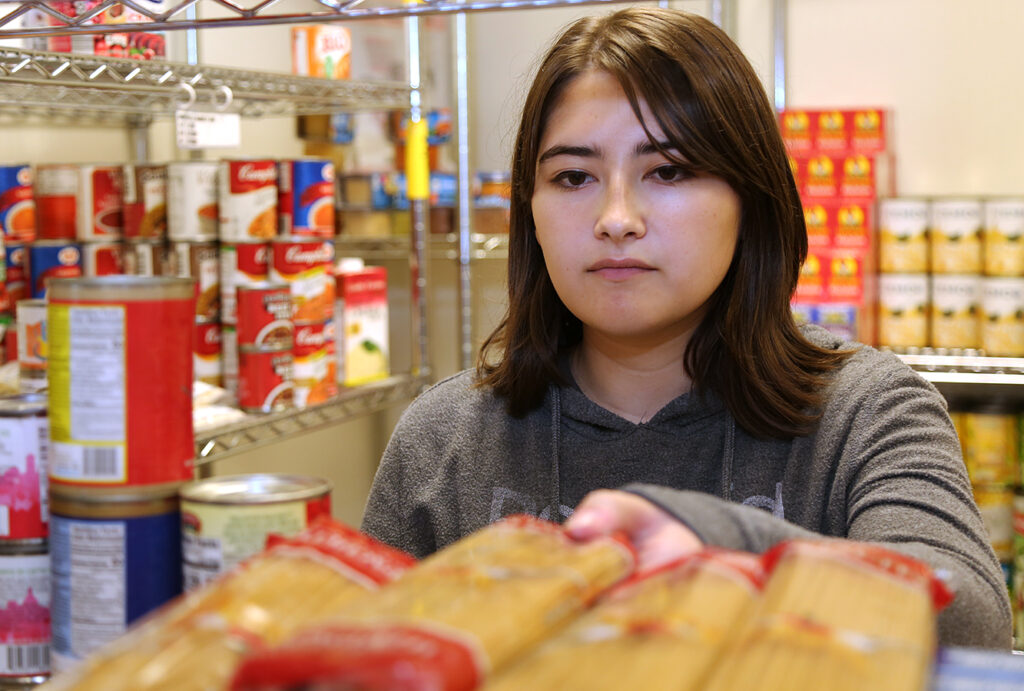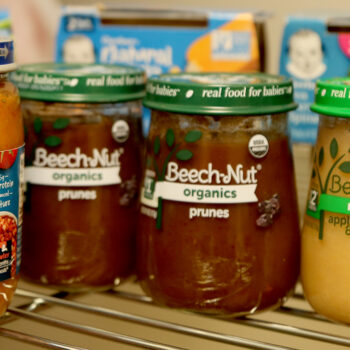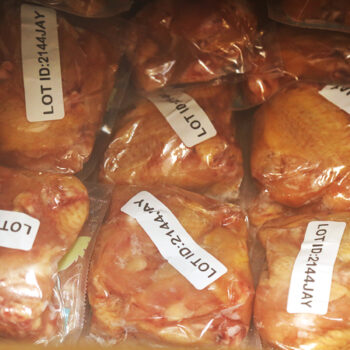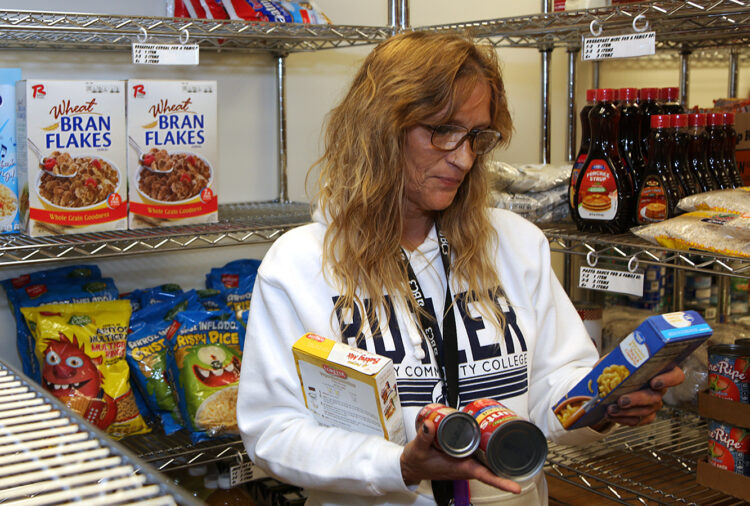(Butler, PA) The frozen chicken wings, fresh sweet potato, boxed pasta and bottled juice Kelly Heckert wheels with other foods in a red wagon from Butler County Community College’s Pioneer Pantry will provide supplemental nutrition for the adult literacy student and her 5-year-old granddaughter.
“Not only are they educating us,” the 51-year-old Butler resident said about students attending the community college, “but they are making sure we are getting the right nutrients.”
Patronage in three years has increased 89 percent in the Pioneer Pantry, created by BC3 following a student survey and a measure the college has taken to address food insecurity as recognized in its designation as a Hunger-Free Campus by the state Department of Education.
The inaugural Hunger-Free Campus designation recognized 28 institutions of higher education in Pennsylvania that have taken measures to address student hunger and qualifies those institutions to seek related grants, according to Gov. Tom Wolf’s administration.
Pennsylvania community colleges collectively serve more low-income students than any other sector of higher education, according to the Pennsylvania Commission for Community Colleges in March.

“We are always looking to grow”
The 2022-2023 state budget allocated $1 million to begin a grant program to support the Hunger-Free Campus initiative that combats food insecurity at postsecondary institutions.
Grants would help institutions of higher education enhance food pantries, increase Supplemental Nutrition Assistance Program outreach, improve data gathering and participate in other initiatives that help to meet the nutritional needs of students, according to Wolf’s office.
“We are always looking to grow,” said Karen Jack, BC3’s project director of a KEYS program whose low-income students such as Heckert receive SNAP benefits.
“And there are always things that we do need.”
Nearly 20 half-gallons of milk were discarded when a compressor failed in a refrigerator used by the Pioneer Pantry sometime during a three-day Labor Day weekend in September, Jack said.
“Those things happen,” Jack said.
Jack leads BC3’s food security team, a group of 10 college administrators or faculty members who address food insecurity among BC3 students and employees.
“Having grants and extra money (will help us) to be able to purchase those kinds of items if we need to or for just expanding.”
BC3 opened the Pioneer Pantry on its main campus in Butler Township in September 2019. The opening followed a 2018 Wisconsin Lab Study survey in which 38 percent of 304 BC3 student respondents indicated they experienced low or very low food security.
“The college really took that to heart,” said Dr. Nick Neupauer, president of BC3. “We’ve done great work in this area, and obviously that work was validated by this tremendous recognition.”
Food security, according to the U.S. Department of Agriculture, “means access by all people at all times to enough food for an active, healthy life.”
“Not only are they educating us, but they are making sure we are getting the right nutrients.”
Kelly Heckert, BC3 student
BC3 pantry served 644 in 2021-2022
Nearly half of community college students in Pennsylvania are considered to be of very low-income, coming from families earning less than $30,000 annually, according to the Pennsylvania Commission for Community Colleges in March.
“I can’t even begin to say how appreciative the people are who visit the pantry,” Jack said. “It is just amazing to me. Even if we serve one student in a week, we help one student not to have to worry about food.”
The Pioneer Pantry served 644 BC3 credit and noncredit students and their families, or BC3 employees and their families, in 2021-2022.
It served 555 in 2020-2021.
And 341 in 2019-2020.
Following the establishment of its Pioneer Pantry, grab-and-go stations debuted and provide free food to students attending BC3’s locations in Armstrong, Butler, Jefferson, Lawrence and Mercer counties.
The college created its additional locations to serve under-represented Pennsylvania counties with higher education.
The percentage of residents reported to be in poverty in Pennsylvania counties are 11.7 in Armstrong, 7.4 in Butler, 11.0 in Jefferson, 12.9 in Lawrence and 12.4 in Mercer, according to the U.S. Census Bureau.
“I see students going in there (to the grab-and-go food station),” said Sean Carroll, director of BC3 @ Lawrence Crossing in New Castle. “I see students coming out with juice boxes or a granola bar, which is great. It serves a great purpose for our students.”
“The grab-and-go station is something that students know is available if they are in need,” said Lauren Buchanan,” director of BC3 @ LindenPointe in Hermitage. … “If a student needs something longer term or substantial we are able to help with our main campus food pantry.”
“The grab-and-go station is used regularly by our students,” said Dr. Jill Martin Rend, director of BC3 @ Brockway in Brockway. “Students appreciate this because they often spend long days in class and it’s hard to go get food. And with the price of gasoline and other items, they often struggle to be able to afford food.”
“We constantly communicate the availability of food insecurity assistance through both the Pioneer Pantry and our grab-and-go station,” said Dr. Ryan Kociela, director of BC3 @ Cranberry in Cranberry Township. “These resources have been utilized by numerous students. The grab-and-go station is a quick and discreet way to help address food insecurity for the students at BC3 @ Cranberry.”
“Community college students need their hard-earned cash for gasoline, car maintenance, books and even tuition,” said Karen Zapp, director of BC3 @ Armstrong near Ford City. “They are grateful to take advantage of free food.”



“It takes a community to support a community”
An estimated 36 percent of students know someone who dropped out of college because of food insecurity during the COVID-19 pandemic, and roughly 52 percent of students who faced food or housing insecurity in 2020 did not apply for support because they did not know how to do so, according to the Wolf administration.
About 22 percent of all undergraduates in 2016 had dependent children and 14 percent were single parents, according to a 2018 report from the U.S. Government Accountability Office.
Heckert, the single BC3 adult literacy student helping to raise her kindergarten granddaughter, is pursuing a commonwealth secondary education diploma at BC3. She then intends to enroll in one of the college’s associate degree programs.
BC3’s Pioneer Pantry “gives me a chance to make sure there are things at home for us.”
“It takes a community to support a community.”
BC3’s Pioneer Pantry is open this fall from 10 a.m. to 4 p.m. Mondays and Tuesdays through Dec. 13.
BC3 employees and community partners raised $5,100 during a week of charitable giving campaign in September that will be used to assemble and distribute approximately 120 food boxes to Pioneer Pantry patrons and their families during the 2022 holidays.
Members of BC3’s food security team are Amanda Fleming, college business services specialist; Amy Gallagher, career development coordinator/academic adviser; Jack; Juli Louttit, director of financial aid; Mikayla Moretti, director of special events, BC3 Education Foundation; Erica Nail, assistant professor of business; Dr. Josh Novak, dean of student development; Torey O’Donnell, associate director of student life; Morgan Rizzardi, director of admissions; and Jennifer Taylor, instructor of business and coordinator of the college’s hospitality management program.





